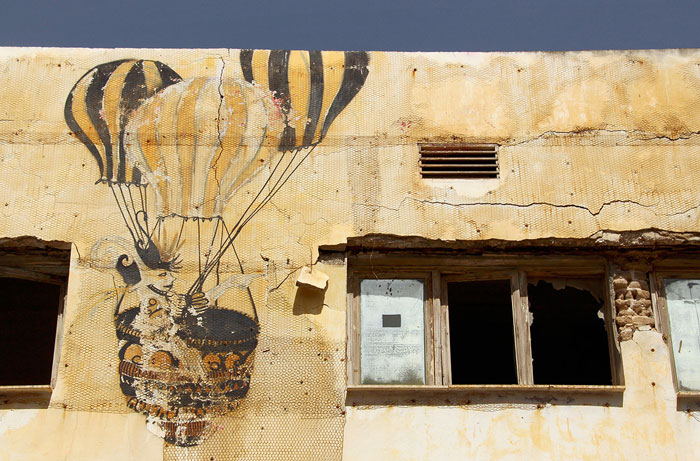Call for Membership: “Beyond the process – Finding common ground for a discussion on planning’s substantial foundation”
The ARL – Academy for Territorial Development in the Leibniz Association is currently establishing an International Working Group “Beyond the process – Finding common ground for a discussion on planning’s substantial foundation” and is looking for participants. The members of the working group will work for approximately three years together and address the topic from inter- and transdisciplinary perspectives.

About the Academy
The ARL is an interdisciplinary forum for research and practice in which spatial and planning-related knowledge is generated and communicated in dialogue. The ARL is a member of the German Leibniz Association and a non-university forum and competence center for sustainable spatial development. The research focus is on spatial structures and developments, their causes and effects, and policy and planning options for their management. The work of the Academy is characterized by holistic, integrative and future-oriented perspectives taken on complex spatial challenges. The close honorary cooperation of actors from spatial and planning-related research and practice forms the core of the Academy’s work. In its function as a transdisciplinary network, the ARL researches spatial structures and developments as the basis and expression of social practice. It is also a place of scientific reflection on planning.
Topic: A missing substantial foundation of planning
The theoretical foundation of what we call (spatial) planning sciences or studies is difficult to grasp. Even researchers in the field of planning disagree on what is meant by a planning theory, by the core of planning or by the subject of planning sciences (e.g. Friedmann 1998, Forester 1989). Seminal writings around planning theory include Faludi’s Reader in Planning Theory (1973) highlighting the procedural aspects of town planning ideology, and the practice of ‘muddling through’. Fainstein in her various contributions (e.g. in 2000) discusses the interlinkages between urban theory and planning theory by focussing on the communicative planning model, new urbanism, and the implications of planning for a just society through bottom-up participatory approaches. Ultimately, most of these academic debates are concerned with the planner’s role in the process of planning. Yet, it is interesting to observe that most of these writings around Planning Theory are Readers in Planning Theory (Faludi in 1973, Fainstein in 2016, Wiechman in 2019), or bring together different theoretical lenses that may be relevant for parts of planning processes (Gunder et al. 2017, Allmendinger & Twedr-Jones 2002) or provide an overview of approaches to planning for teaching purposes (Allmendinger 2009, 2017), but do not outline what a planning theory constitutes of and what lies beyond procedural aspects.
If one considers (planning) sciences in general as knowledge foundation of the profession in which planning actions are reflected, analysed, discussed and modified, this missing theoretical foundation leads to a multitude of problems – for researchers in spatial planning, for planners in practice and for scientific institutions. The lack of clear explicit understandings of spatial planning, its foundations and theoretical core aspects leads to insufficient clarifications of the arguments in the academic debate itself and, in the worst case, fundamental incomprehension. Practitioners in the field of planning, however, hardly benefit from contemporary planning theories, resembling ideal-typical reflections on planning processes far off everyday challenges. However, this weakness of planning sciences is becoming increasingly noticeable for scientific institutions such as universities, colleges and academies as well: Academic planning institutions struggle to compete for scientific excellence under the condition of quality standards and evaluation criteria. They face sweeping obligations to justify planning’s interdisciplinary approach, its knowledge foundations and its scientific nature. In sum, planning sciences hardly provide researchers and practitioners with sufficient knowledge to improve both theories and practices.
In the academic discussion, a debate about substantial foundations of planning, knowledge specific to planning subjects as well as the scientific perspectives of planning is hardly ever held. This is the starting point of the suggested International Working Group.
Objectives and workflow
The International Working Group aims to provide a platform for setting planning sciences on the move, through innovative debates about the challenges, barriers and necessities to rethink planning sciences, its origins and characteristics. A crucial challenge is to focus on those issues that are of direct relevance to spatial planning as scientific activity.
This implies to rethink
- what spatial planning is and what is meant by planning,
- what the paradigmatic foundations of planning sciences/ studies are and the impact they have on planning research and practice,
- what distinguishes planning approaches from conceptions, models and theories in and especially of planning,
- about the theoretical linkages and complementarities with other sciences and their theoretical foundations
- about quality standards of an interdisciplinary research without neglecting disciplinary origins
- or the role of space in planning sciences.
Thereby we do not seek to reduce planning to one universal understanding or to develop one overarching planning theory – in contrast, it is the crucial challenge to build a complex puzzle of what planning might be and elaborate on a contemporary understanding of planning sciences in the 21st century. Further, it shall encourage scholars to make space for theoretical furthering of ‘planning’ itself.
The high demands on starting a joint discussion about this long-time tabooed topic longs for an intensive exchange of ideas, thoughts, perspectives and critiques on planning sciences within the group. Especially semantic differences in the meaning of key terms like (spatial) planning or planning sciences or studies and their national, cultural and personal backgrounds ask for an intense exchange to be able to speak and understand each other at all. Therefore, the International Working Group starts with a 3-day kick-off seclusion in December 2020*, followed up by several joint working meetings and meetings in sub-groups.
Organisation and Output
The group will consist of up to twelve permanent expert members, complemented by invited experts relevant to the topics of research. We will meet twice a year for three years, starting in December 2020 with a 3-day workshop, followed by two day-long meetings in 2021 and 2022 (spring and autumn*). The ARL will reimburse travel expenses to all working group members and invited experts according to the German Federal Travel Expenses Act. Additionally, open meetings with the participation of scholars or the organization of sessions and/or the presentation of findings at international conferences (AESOP, PLPR) are possible to promote exchange and communication across Europe.
The research and work program will be set out at the constituent meeting. The members are expected to contribute actively to this program. Diverse outputs (academic papers, i.e. through a special issue, edited volume, roundtable discussions etc.) are imaginable to increase the debate’s visibility in the scientific community.
*Changes of schedule might apply due to Covid-19 related travel restrictions and virtual meetings might be organized in the early stage of this working group. The academy prefers personal meetings whenever possible.
Application
The Call for Membership is addressed to representatives of different disciplines (e.g. geography, spatial planning, sociology, political sciences or international relations) who have solid expertise on planning research and are interested in contributing actively to the aforementioned objectives of this working group. Applications from both researchers and practitioners of all stages of experience are welcome. We particularly welcome researchers and practitioners who have a keen interest in revisiting the relevance of the main debates in planning theory and its terminology.
If you are interested in participating in the International Working Group, please submit your statement of interest (in digital form) by
22.05.2020
In your statement of interest, you should
- briefly outline your personal interest in participating, your research perspectives and potential contributions to the working group (max. 300 words),
- present a short CV including a list of relevant publications/projects
Please send your application in digital form to the ARL – Academy for Territorial Development in the Leibniz Association: mena@arl-net.de (Vanessa Mena). You will be informed by end of June 2020.
Questions regarding the topic and objectives of the working can also be send to Meike Levin-Keitel (TU Dortmund University; meike.levin-keitel@tu-dortmund.de) and Franziska Sielker (University of Cambridge; fs421@cam.ac.uk).
Contact
Dr. Martin Sondermann
ARL – Academy for Territorial Development in the Leibniz Association
ead of Academic Section I “Society and Culture“
Vahrenwalder Straße 247
30179 Hannover (Germany)
+49 511 34842-23
sondermann@arl-net.de



